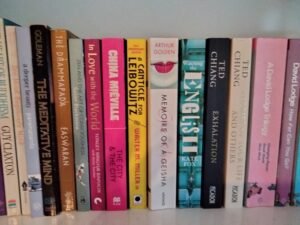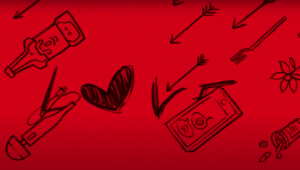Romance has two strict genre rules.
Firstly, the love story must be central to the story. Although there can be interweaving subplots, the story is about the protagonists and their relationship. That’s the point. Remove it and there should be nothing left – no love story, no novel.
Secondly, the ending must be optimistic and emotionally satisfying. The romantic leads must overcome all their obstacles and get it together. They must fall in love, and admit it to each other. It must be ‘happy ever after’ or, at the very least convincingly ‘happy for now’. If it doesn’t end well or the romantic leads aren’t together in the end, then it’s not a romance.
Romances are process novels. The readers know how it is going to end, they just want to know how the characters got there. It’s the journey, not the destination.
Five Not Romances
These are some of my very favourite novels. They are love stories, but for years I thought they were romances. It is only now, when I’ve started writing my own, that I’ve realised that they break romance genre conventions. They are all beautiful love stories, but they are not in the romance genre.
Spoiler Alert: Because a romance novel is defined by its ending, I give away significant plot points for each novel below. If you like surprises then don’t read on – however, as I now know, romance fans don’t need surprises. They need happy endings.
Me Before You
by Jojo Moyes

A love story between a paraplegic man, Will Traynor, and his carer, Lou Clark.
It’s the characters that make this novel so strong. Lou is amazing. I love her boho outfits, ditzy floatiness, and her amazing emotional strength, and Will Traynor is great too. She is a chaotic delight, and he is a justifiably miserable sod. Of course, Lou thaws Will’s icy exterior, and Will proves to have a heart of gold. It’s a perfect grumpy sunshine romance.
Until it’s not. There is no happy ending for the two of them. They don’t get together and they never will. Lou has grown as a person, and Will has found peace – but not together. So not a romance.
Also, don’t bother with the film. It’s OK, but the chemistry between the leads doesn’t fizz.
One Day
by David Nicholls

Recently brilliantly remade as a Netflix miniseries, but the book is just as good and maybe better. It’s one of the comp titles for my work in progress, and like Love And Distraction, its structure is the essence of the story. In One Day the romantic leads meet every Saint Swithin’s day. They are drawn to each other, but never quite get it together.
It’s the friends to lovers trope, and over the years they do gradually fall in love. They are made for each other, but it takes over a decade for them to admit it and come together, as they surely must.
It’s the perfect romance, until the end, when David Nicholls, wrenches them apart – permanently. Not a romance then.
Brooklyn
by Colm Tóibín

There was a time when every other book published seemed to be about the immigrant story. After diligently reading all the all recommends, I became jaded and looked elsewhere for my fiction fix. So I was a bit unsure when my father recommended Brooklyn for our bookclub read – more immigrant tales. What more can be said about the theme?
But this is a wonderful book; elegantly written without being overwritten, and sparsely told yet full of warmth. The burgeoning romance between Irish Ellis Lacey and Italian Tony Fiorello is central. It’s beautiful, with the required ups and downs, and it ends well for both of them. They stay together and the book implies that they will be happy.
Not a romance though. If the love story was stripped out of the book, then it would still hold together as a narrative, albeit a far less engaging one. The story is Ellis’s. It’s her character that emigrates from Ireland to New York, and it’s her struggles that we care about. It’s not about Ellis and Tony, it’s just about Ellis.
South Riding
by Winifred Holtby

An underrated book, that deserves to be more widely read and widely loved. It’s the story of local government in a fictional Yorkshire town. It’s not the most gripping log line, so I understand why it’s not at the top of everyone’s to read list. Nevertheless it is a captivating tale of struggles, disappointment, and triumphs, in an easily forgotten part of the world.
There is a cast of characters to rival Dickens, but unlike Dickens they aren’t grotesques or caricatures. They are full of life, warmth, hopes and dreams – you fear the best of them and love the worst.
The two romantic leads, Sarah Burton and Robert Carne are compelling. It’s not quite grumpy sunshine – he is certainly grumpy but to call Sarah Burton sunshine is to do her a massive disservice. It’s more grumpy / radiant super nova and force of nature.
But it isn’t a romance. They don’t get together in the end. I really really wanted them to, but they didn’t and the book is better for it. Also, there is too much other great stuff happening in the South Riding for it to be a straight romance. It’s classic fiction with a gorgeous love story embedded in its heart. It’s wonderful.
The Time Traveller’s Wife
by Audrey Niffenegger

I love books that make me cry, and this one is a tear-fest.
Henry DeTamble is a librarian with a genetic impairment that causes him to involuntary travel through time. Claire Anne Abshire is his wife. All marriages have their ups and downs, but Henry and Claire have it tough. He often finds himself catapulted into difficult temporal situations and his clothes don’t go with him. He pops up naked all over the place, and pings in and out of Claire’s timeline. But they love each other and their love wins out. They overcome all their obstacles – until they don’t and Claire and Henry are separated forever.
But even after the worst has happened, Claire and Henry are still together. He continues to wander up and down her time line, and at the very end of the book he returns to her, when she is eighty and he is a young man. That’s when I cried.
A truly special book, and one of my very favourites. There aren’t many (non-ludicrous) science fiction love stories – but this is one of them. Probably not a romance though, as Henry and Claire, don’t live happily ever after. Except they kind of do, because Henry comes in and out of time. And what does ‘happily ever after’ really mean to a time traveller and his wife anyway?
Photo by Everton Vila on Unsplash


